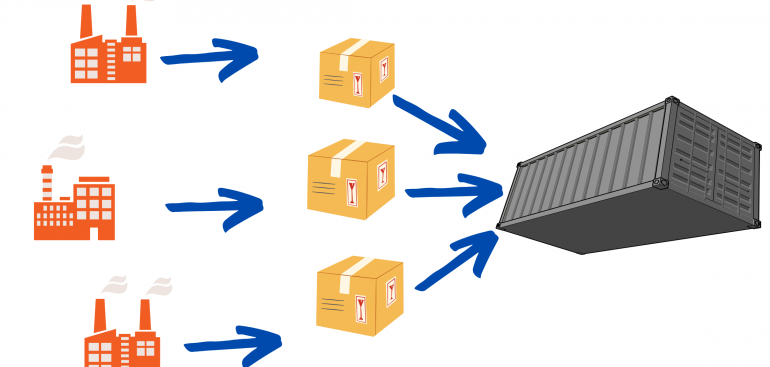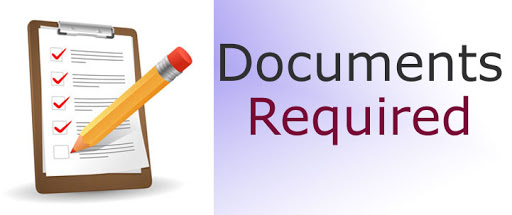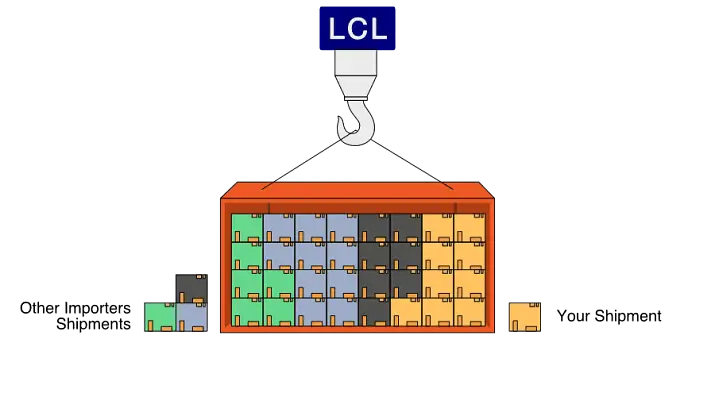- By TOP CHINA FREIGHT
- October 13, 2025
- Shipping
Table of Contents
LCL shipping China to Spain allows importers to move smaller cargo volumes without paying for a full container. For small and medium-sized businesses, this flexible option provides affordability, efficiency, and reliability. However, understanding how LCL works, including cost breakdowns, transit time, and customs rules, is essential to avoid hidden issues and ensure a smooth supply chain. This comprehensive guide covers every aspect—from shipment preparation to cost-saving strategies—so you can manage your logistics with confidence.

What Is LCL Shipping from China to Spain?
LCL (Less than Container Load) shipping means your goods share container space with other shipments heading to the same destination. This option is ideal for importers whose cargo doesn’t fill a full container (FCL).
When you ship LCL from China to Spain, your freight forwarder consolidates cargo from multiple clients into one container. Once it arrives in Spain, it’s deconsolidated and distributed.
Key benefits of LCL shipping:
- Lower shipping cost compared to FCL
- Flexibility in shipment size and frequency
- Reduced storage and inventory costs
- Suitable for startups and e-commerce sellers
Common LCL routes from China to Spain:
| Origin Port | Destination Port | Transit Time (Days) | Mode |
|---|---|---|---|
| Shanghai | Valencia | 28–33 | Sea |
| Shenzhen | Barcelona | 30–35 | Sea |
| Ningbo | Bilbao | 32–36 | Sea |
How Does LCL Shipping from China to Spain Work?
LCL freight follows a structured process that ensures smooth coordination between exporters, forwarders, and customs.
Step-by-step process:
1.Cargo booking:
You confirm shipment details with your freight forwarder.
2.Consolidation:
Goods from various suppliers are collected and packed together.
3.Export customs clearance:
Documentation is verified and customs duties processed.
4.Ocean transport:
Containers are shipped from China to Spain by sea.
5.Deconsolidation:
Cargo is separated at the destination port.
6.Final delivery:
Goods are delivered to your warehouse or buyer’s address.
This process ensures efficiency and minimizes empty space in containers—ideal for optimizing freight budgets.
How Much Does LCL Shipping from China to Spain Cost?

The cost of LCL shipping China to Spain depends on several factors such as weight, volume (CBM), route, and service type.
Typical LCL cost structure:
| Charge Type | Description | Average Cost (USD) |
|---|---|---|
| Ocean Freight | Main sea freight charge | $35–$60 per CBM |
| Origin Fees | Packing, handling, documentation | $40–$80 per shipment |
| Destination Fees | Customs, unloading, delivery | $70–$120 per CBM |
Factors influencing cost:
- Peak season demand (usually Sept–Dec)
- Type of goods (hazardous or oversized items cost more)
- Shipping route and port congestion
- Value-added services like palletizing or insurance
To optimize your freight budget, consolidate shipments strategically and plan ahead during low season.
What Is the Transit Time for LCL from China to Spain?
Transit time varies depending on the departure port, destination port, and carrier schedule.
Estimated transit times:
| Route | Transit Time (Days) | Notes |
|---|---|---|
| Shanghai – Valencia | 28–33 | Stable schedule |
| Ningbo – Barcelona | 30–35 | Slightly longer due to stopovers |
| Shenzhen – Bilbao | 33–38 | Ideal for southern Spain deliveries |
Tips to reduce delays:
- Ensure complete and correct documentation.
- Avoid last-minute bookings during the peak season.
- Choose reputable freight forwarders with regular consolidation schedules.
What Documents Are Required for LCL Shipping?

LCL shipping from China to Spain requires standard export-import paperwork to comply with customs laws.
Common documents checklist:
| Document | Purpose |
|---|---|
| Bill of Lading (B/L) | Proof of shipment and ownership |
| Commercial Invoice | Declares product value for customs |
| Packing List | Details weight and packaging |
| Certificate of Origin | Identifies manufacturing country |
| Import License | Required for restricted items |
Accurate and complete documents not only prevent customs delays but also ensure compliance with Spanish import regulations.
How to Save Money on LCL Shipping from China to Spain?
Avoid rush fees and peak-season surcharges.
Uniform cartons fit better and reduce wasted CBM.
They can consolidate your multiple orders.
Regular shipments often get better rates.
What Are the Pros and Cons of LCL Shipping?

Advantages:
- Lower cost for small shipments
- Flexible scheduling
- Environmentally friendly (shared space reduces emissions)
Disadvantages:
- Slightly longer transit time due to consolidation
- Higher handling risk during loading/unloading
- Shared container means less control over scheduling
Comparison Table:
| Criteria | LCL Shipping | FCL Shipping |
|---|---|---|
| Cost | Lower for small cargo | More cost-effective for large loads |
| Control | Shared space | Full control of container |
| Transit Time | Slightly longer | More predictable |
| Risk | Moderate | Lower |
Case Study: LCL Shipment from Shenzhen to Valencia

A Spanish importer of electronic accessories shipped 6 CBM of goods from Shenzhen to Valencia. By choosing LCL instead of FCL, the importer saved over $900 in freight costs.
The forwarder consolidated the cargo with three other shipments, ensuring full container utilization. Despite a 3-day delay during customs inspection, the goods arrived safely and within budget.
Key takeaway:
LCL shipping is ideal for smaller shipments with flexible delivery deadlines.
Should You Choose LCL or Air Freight from China to Spain?
While air freight is faster, it’s much more expensive than sea freight.
| Shipping Mode | Cost per KG | Transit Time | Best For |
|---|---|---|---|
| LCL (Sea) | $35–$60 per CBM | 28–35 days | Heavy, non-urgent goods |
| Air Freight | $5–$10 per KG | 5–10 days | Urgent or high-value goods |
Recommendation:
For bulky or non-time-sensitive cargo, LCL shipping offers far greater value.
Conclusion
LCL shipping China to Spain provides a cost-efficient and flexible solution for businesses that don’t require full containers. By understanding its cost structure, transit process, and documentation requirements, importers can minimize risks and optimize logistics. Planning ahead, consolidating orders, and working with experienced freight partners are key to successful LCL shipping.
Need a Shipping Quote?
If you want expert guidance and peace of mind, our team is ready to assist.
TJ China Freight offers tailored solutions to help businesses of all sizes ship more reliably from China.

FAQ
Q1: What is the minimum volume for LCL shipping from China to Spain?
Usually, the minimum is 1 CBM, though forwarders may accept slightly less with surcharges.
Q2: How are LCL shipping rates calculated?
They’re based on the greater of volume (CBM) or weight, plus handling and destination fees.
Q3: Can LCL shipments be insured?
Yes, marine insurance can cover damages, theft, or loss during transport.
Q4: Is customs clearance required for LCL shipments?
Yes, both Chinese export and Spanish import clearance are mandatory for all shipments.
Q5: How can I track my LCL shipment?
Forwarders provide tracking numbers or online systems showing status updates.
